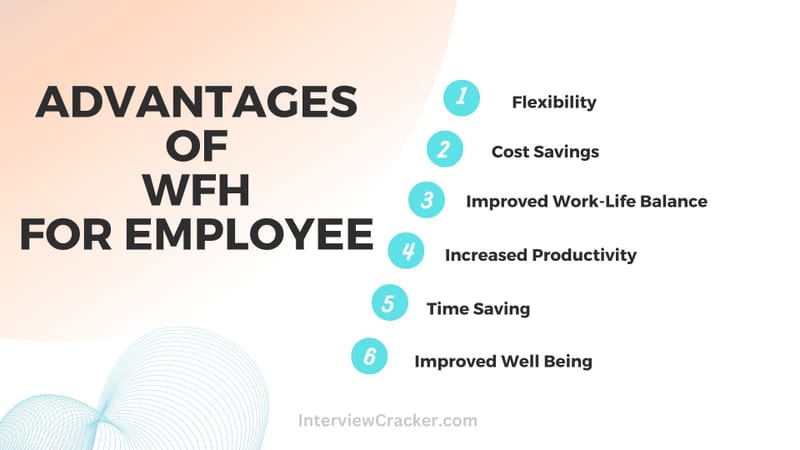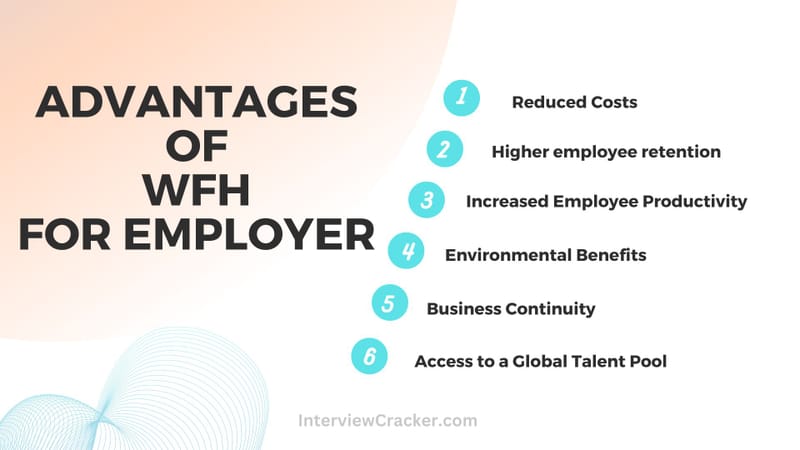In recent times, the term “WFH” has gained significant prominence, reflecting a fundamental shift in the way we work. WFH, an acronym for Work from Home, has become more than just a trend; it’s a new way of life for millions worldwide. In this blog, we’ll explore the meaning, implications, and rise of WFH, shedding light on its full form, significance, and the burgeoning WFH job market.
Table of Contents
ToggleWhat is WFH? What is Work From Home Mean?
Work from home is a work arrangement where employees conduct their job responsibilities remotely, typically from their residence rather than commuting to a central workplace. It offers flexibility and autonomy, allowing individuals to balance professional commitments with personal obligations more effectively.
What is WFH Full Form? What is WFH Meaning?
WFH full form is Work from Home. WFH means work from home. Many companies give their employees an option to work from home, that is called remote work as well.

Synonyms of Work from Home
- Telecommuting
- Remote Work
- Teleworking
- Virtual Work
- Home Office
- Distributed Work
- Flexible Working
- Digital Nomad Lifestyle
Telecommuting, offers various benefits, including increased flexibility and improved work-life balance. According to Remote Work Benefits, employees enjoy the freedom to manage their schedules and eliminate time-consuming commutes.
However, telecommuting also comes with its share of challenges. Remote Work Challenges such as isolation and communication barriers may affect productivity and collaboration among team members.
To overcome these challenges, individuals can implement effective strategies for remote work. Telecommuting Guide offers valuable insights into establishing a productive remote work routine and maintaining work-life balance.
The WFH Job Landscape
In today’s digital age, advancements in technology and communication have facilitated the proliferation of WFH jobs across various industries. From software development and digital marketing to customer service and virtual assistance, the scope of WFH opportunities is vast and diverse.
Advantages of WFH
The rise of WFH has brought forth numerous benefits for both employers and employees.

Some of the Key Advantages for Employees Include
- Flexibility: WFH allows individuals to create their schedules, accommodating personal commitments and preferences.
- Cost Savings: Employees can save on commuting expenses, office attire, and dining out, contributing to significant cost savings over time.
- Improved Work-Life Balance: WFH promotes a healthier work-life balance by reducing commute stress and providing more time for family and personal pursuits. Read: Is Work Life Balance a Myth?
- Increased Productivity: Many individuals find that they are more productive in a familiar and comfortable environment, leading to enhanced performance and efficiency. Read : Productivity Quote
- Time Saving
- Improved Well Being

Some of the Key Advantages of WFH for Employers Include
- Reduced Overhead Costs: Savings on office space, utilities, and other operational expenses.
- Increased Employee Productivity : Flexible work environments can lead to higher productivity as employees can work in their most effective settings.
- Access to a Global Talent Pool: Ability to hire skilled professionals from anywhere in the world, not limited by geographic location.
- Higher employee retention: Enhanced job satisfaction and work-life balance can lead to higher employee retention rates.
- Environmental Benefits :Reduced commuting contributes to lower carbon footprints and supports corporate sustainability goals.
- Business Continuity: Remote work capabilities ensure that business operations can continue uninterrupted during emergencies or unexpected disruptions.
Challenges and Considerations
- Isolation: Working remotely can lead to feelings of isolation and disconnection from colleagues, impacting morale and team cohesion.
- Work-Life Boundaries: Without clear boundaries, individuals may find it challenging to separate work from personal life, leading to burnout and stress.
- Technological Constraints: Dependence on technology for communication and collaboration may pose challenges related to connectivity, security, and technical support.
How to WFH Successfully
- Set Up a Dedicated Workspace: Create a distraction-free area conducive to productivity.
- Establish a Routine: Mirror a typical workday with regular start and end times, and scheduled breaks.
- Prioritize Tasks : Create a daily to-do list and set clear goals.
- Stay Connected: Maintain teamwork and collaboration through regular check-ins and virtual meetings.
- Invest in Technology: Use the right tools to facilitate smooth workflow and communication.
- Maintain Work-Life Balance: Set boundaries between work and personal time to avoid overworking.
Essential Work From Home Tools to Get You Through
- Reliable Internet Connectivity: Ensure strong and stable internet access.
- Collaboration Tools: Use Slack, Microsoft Teams, or Zoom for communication and virtual meetings.
- Project Management Software: Track tasks, deadlines, and project progress with Trello, Asana, or Monday.com.
- Cloud Storage Solutions: Access important documents from anywhere with Google Drive or Dropbox.
- Time Management Tools: Track work hours and maintain productivity with Toggl or Clockify.
- Ergonomic Office Furniture: Invest in a comfortable chair and proper lighting for a productive setup.
Embracing the Future of Work
As the world continues to adapt to evolving work dynamics, WFH is poised to remain a cornerstone of the modern work landscape. Organizations must embrace flexibility, leverage technology, and foster a supportive remote work culture to thrive in the digital era.
In conclusion, WFH represents more than just a shift in work dynamics; it signifies a paradigm shift in how we perceive work and productivity. By understanding its full form, meaning, and implications, individuals and organizations can harness the transformative power of WFH to create a more flexible, efficient, and inclusive work environment.
Frequently Asked Questions
What is WFH job ? | What is Work from Home Jobs?
A WFH job, also known as a Work from Home job, refers to employment opportunities where individuals can perform their job responsibilities remotely from the comfort of their own homes, rather than commuting to a traditional office setting. Work from Home jobs have become increasingly prevalent in recent years, facilitated by advancements in technology and changes in workplace dynamics.
Which Industry and Role can do WFH Jobs?
Work from Home jobs can span across various industries and roles, including but not limited to:
Work from Home jobs offer numerous advantages, including flexibility, cost savings, improved work-life balance, and increased productivity. However, they also come with unique challenges, such as potential feelings of isolation, the need for self-discipline, and technological considerations.
- Digital Marketing: Roles such as social media management, content writing, and search engine optimization can often be performed remotely.
- Software Development and IT: Many software developers, programmers, and IT professionals have the flexibility to work remotely, collaborating with teams virtually.
- Customer Service and Support: Customer service representatives and support staff often work from home, providing assistance via phone, email, or chat. Suggested Read: Career as a Customer Service
- Virtual Assistance: Virtual assistants offer administrative support, scheduling, and other tasks remotely to businesses and individuals.
- Teaching and Tutoring: With the rise of online learning platforms, educators and tutors can conduct classes and sessions remotely from home. Resume for Teachers
- Freelancing and Consulting: Freelancers and consultants across various fields, including graphic design, writing, and web development, often work remotely on a project basis.
What is WFH Meaning in Chat?
WFH stands for “Work From Home.” It’s a term that resonates with comfort, flexibility, and convenience. It signifies the freedom to create your own workspace, set your schedule, and embrace a healthier work-life balance.
Overall, Work from Home jobs provide individuals with the opportunity to pursue fulfilling careers while enjoying the benefits of remote work. As the trend towards remote work continues to grow, the availability and variety of Work from Home jobs are expected to expand, offering more flexibility and opportunities for professionals around the world.
What does Work From Home Career Mean?
A “Work From Home Career” refers to a occupation that allows individuals to perform their work duties remotely from the comfort of their own homes.
This arrangement enables individuals to balance their professional responsibilities with personal priorities, offering flexibility in terms of work hours and location. Work from home careers can encompass a wide range of industries and professions, including freelance work, remote employment with companies, entrepreneurship, telecommuting, and online businesses. The concept gained significant traction in recent years, particularly with advancements in technology, which facilitate seamless communication and collaboration regardless of physical distance. As such, work from home careers provide individuals with the opportunity to achieve a better work-life balance, reduce commuting stress, and often enhance productivity and job satisfaction.
Conclusion
Whether you’re a seasoned remote worker or embarking on your WFH journey, embracing the possibilities of remote work can lead to greater flexibility, autonomy, and fulfillment in both professional and personal spheres. As the saying goes, the future of work is here, and it’s remote.



“Nice post! Learned something new today. Keep up the great work.”